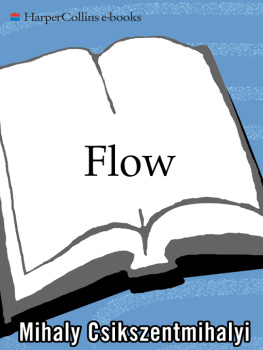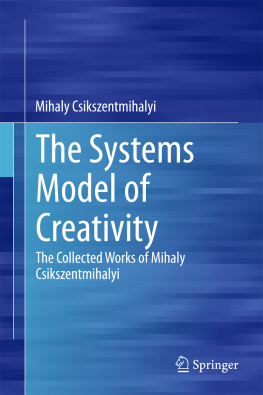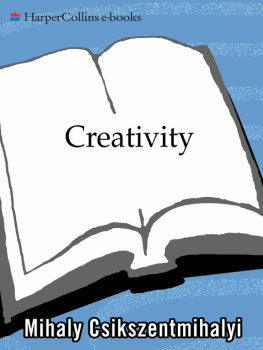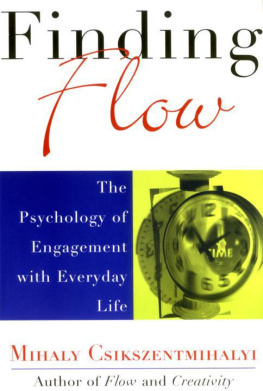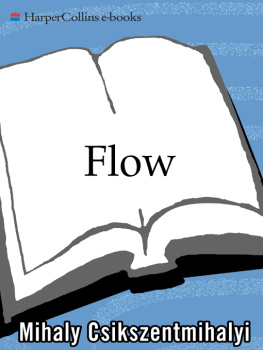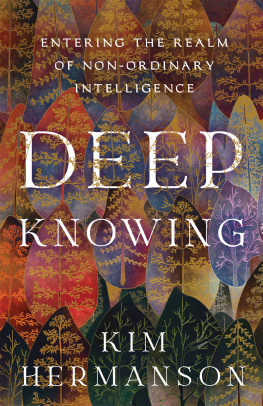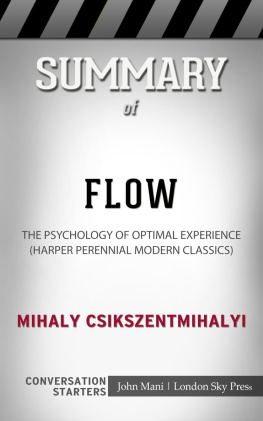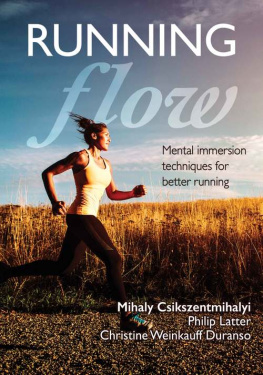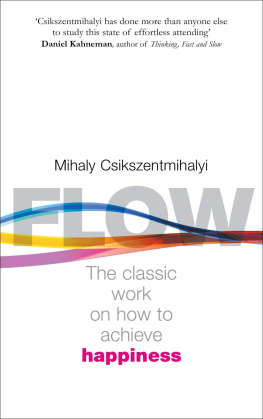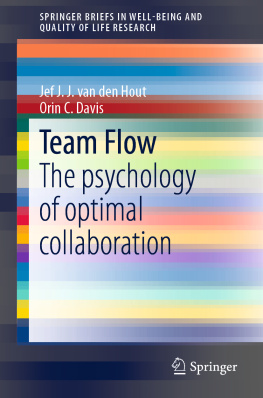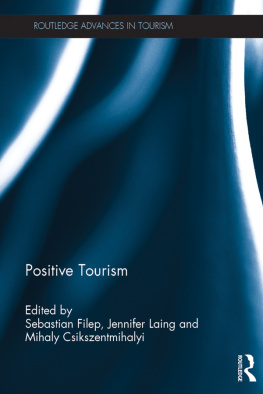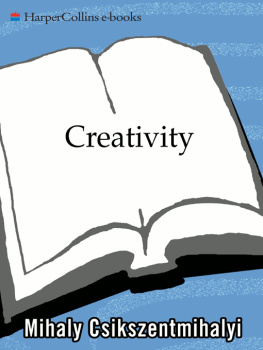Flow
The Psychology of Optimal Experience
Mihaly Csikszentmihalyi

For Isabella, and Mark and Christopher
T HIS BOOK SUMMARIZES , for a general audience, decades of research on the positive aspects of human experiencejoy, creativity, the process of total involvement with life I call flow . To take this step is somewhat dangerous, because as soon as one strays from the stylized constraints of academic prose, it is easy to become careless or overly enthusiastic about such a topic. What follows, however, is not a popular book that gives insider tips about how to be happy. To do so would be impossible in any case, since a joyful life is an individual creation that cannot be copied from a recipe. This book tries instead to present general principles , along with concrete examples of how some people have used these principles, to transform boring and meaningless lives into ones full of enjoyment. There is no promise of easy short-cuts in these pages. But for readers who care about such things, there should be enough information to make possible the transition from theory to practice.
In order to make the book as direct and user-friendly as possible, I have avoided footnotes, references, and other tools scholars usually employ in their technical writing. I have tried to present the results of psychological research, and the ideas derived from the interpretation of such research, in a way that any educated reader can evaluate and apply to his or her own life, regardless of specialized background knowledge.
However, for those readers who are curious enough to pursue the scholarly sources on which my conclusions are based, I have included extensive notes at the end of the volume. They are not keyed to specific references, but to the page number in the text where a given issue is discussed. For example, happiness is mentioned on the very first page. The reader interested in knowing what works I base my assertions on can turn to the notes section beginning and, by looking under the reference, find a lead to Aristotles view of happiness as well as to contemporary research on this topic, with the appropriate citations. The notes can be read as a second, highly compressed, and more technical shadow version of the original text.
At the beginning of any book, it is appropriate to acknowledge those who have influenced its development. In the present case this is impossible, since the list of names would have to be almost as long as the book itself. However, I owe special gratitude to a few people, whom I wish to take this opportunity to thank. First of all, Isabella, who as wife and friend has enriched my life for over twenty-five years, and whose editorial judgment has helped shape this work. Mark and Christopher, our sons, from whom I have learned perhaps as much as they have learned from me. Jacob Getzels, my once and future mentor. Among friends and colleagues I should like to single out Donald Campbell, Howard Gardner, Jean Hamilton, Philip Hefner, Hiroaki Imamura, David Kipper, Doug Kleiber, George Klein, Fausto Massimini, Elisabeth Noelle-Neumann, Jerome Singer, James Stigler, and Brian Sutton-Smithall of whom, in one way or another, have been generous with their help, inspiration, or encouragement.
Of my former students and collaborators Ronald Graef, Robert Kubey, Reed Larson, Jean Nakamura, Kevin Rathunde, Rick Robinson, Ikuya Sato, Sam Whalen, and Maria Wong have made the greatest contributions to the research underlying the ideas developed in these pages. John Brockman and Richard P. Kot have given their skillful professional support to this project and have helped it along from start to finish. Last but not least, indispensable over the past decade has been the funding generously provided by the Spencer Foundation to collect and analyze the data. I am especially grateful to its former president, H. Thomas James, to its present one, Lawrence A. Cremin, and to Marion Faldet, vice-president of the foundation. Of course, none of those mentioned above are responsible for what might be unsound in the bookthat is exclusively my own doing.
Chicago, March 1990
T WENTY-THREE HUNDRED YEARS AGO Aristotle concluded that, more than anything else, men and women seek happiness. While happiness itself is sought for its own sake, every other goalhealth, beauty, money, or poweris valued only because we expect that it will make us happy. Much has changed since Aristotles time. Our understanding of the worlds of stars and of atoms has expanded beyond belief. The gods of the Greeks were like helpless children compared to humankind today and the powers we now wield. And yet on this most important issue very little has changed in the intervening centuries. We do not understand what happiness is any better than Aristotle did, and as for learning how to attain that blessed condition, one could argue that we have made no progress at all.
Despite the fact that we are now healthier and grow to be older, despite the fact that even the least affluent among us are surrounded by material luxuries undreamed of even a few decades ago (there were few bathrooms in the palace of the Sun King, chairs were rare even in the richest medieval houses, and no Roman emperor could turn on a TV set when he was bored), and regardless of all the stupendous scientific knowledge we can summon at will, people often end up feeling that their lives have been wasted, that instead of being filled with happiness their years were spent in anxiety and boredom.
Is this because it is the destiny of mankind to remain unfulfilled, each person always wanting more than he or she can have? Or is the pervasive malaise that often sours even our most precious moments the result of our seeking happiness in the wrong places? The intent of this book is to use some of the tools of modern psychology to explore this very ancient question: When do people feel most happy? If we can begin to find an answer to it, perhaps we shall eventually be able to order life so that happiness will play a larger part in it.
Twenty-five years before I began to write these lines, I made a discovery that took all the intervening time for me to realize I had made. To call it a discovery is perhaps misleading, for people have been aware of it since the dawn of time. Yet the word is appropriate, because even though my finding itself was well known, it had not been described or theoretically explained by the relevant branch of scholarship, which in this case happens to be psychology. So I spent the next quarter-century investigating this elusive phenomenon.
What I discovered was that happiness is not something that happens. It is not the result of good fortune or random chance. It is not something that money can buy or power command. It does not depend on outside events, but, rather, on how we interpret them. Happiness, in fact, is a condition that must be prepared for, cultivated, and defended privately by each person. People who learn to control inner experience will be able to determine the quality of their lives, which is as close as any of us can come to being happy.
Yet we cannot reach happiness by consciously searching for it. Ask yourself whether you are happy, said J. S. Mill, and you cease to be so. It is by being fully involved with every detail of our lives, whether good or bad, that we find happiness, not by trying to look for it directly. Viktor Frankl, the Austrian psychologist, summarized it beautifully in the preface to his book Mans Search for Meaning: Dont aim at successthe more you aim at it and make it a target, the more you are going to miss it. For success, like happiness, cannot be pursued; it must ensueas the unintended side-effect of ones personal dedication to a course greater than oneself.

